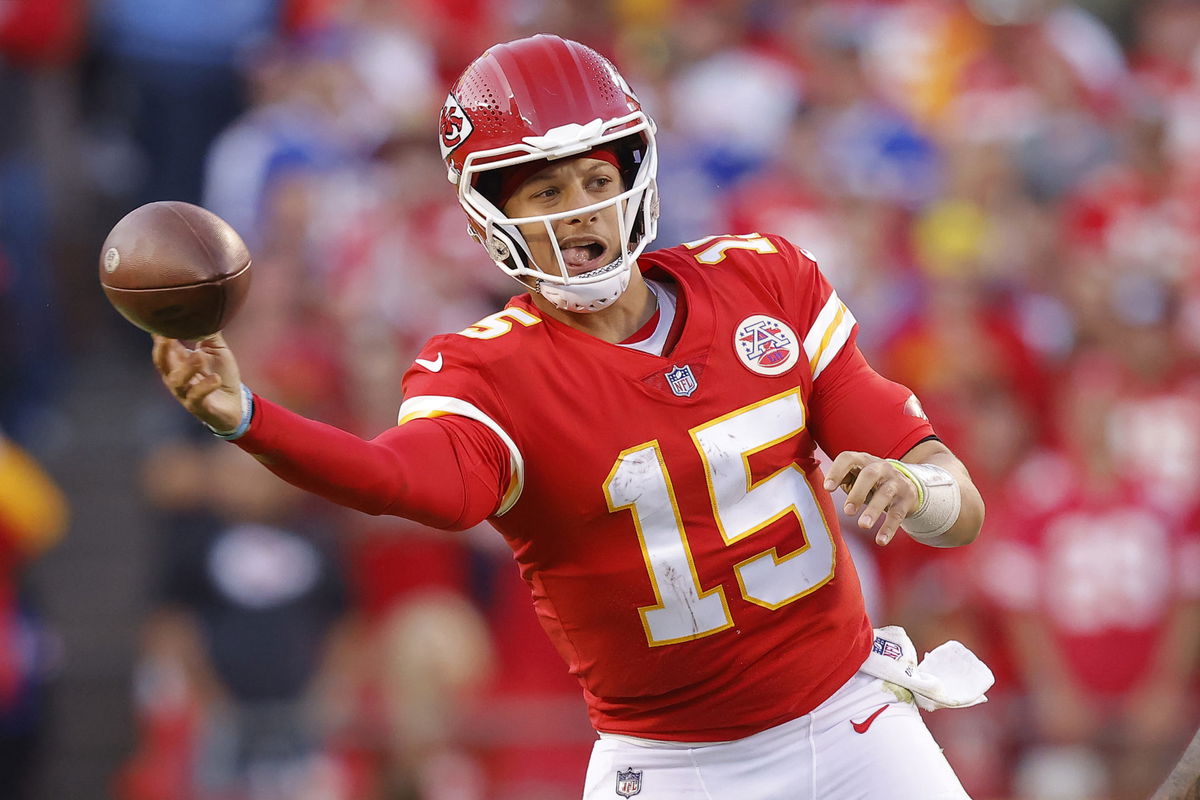
Getty
KANSAS CITY, MISSOURI – OCTOBER 16: Patrick Mahomes #15 of the Kansas City Chiefs throws the ball during the fourth quarter against the Buffalo Bills at Arrowhead Stadium on October 16, 2022 in Kansas City, Missouri. (Photo by David Eulitt/Getty Images)

Getty
KANSAS CITY, MISSOURI – OCTOBER 16: Patrick Mahomes #15 of the Kansas City Chiefs throws the ball during the fourth quarter against the Buffalo Bills at Arrowhead Stadium on October 16, 2022 in Kansas City, Missouri. (Photo by David Eulitt/Getty Images)
With access to the huddle, homes, and mindsets of Patrick Mahomes, Kirk Cousins, and Marcus Mariota, Netflix’s Quarterback led serious viewers to raise some questions about sports documentaries as a tool and genre in 2023. How did Quarterback by Netflix represent the NFL to global viewers? What exactly did it tell about the inside of a professional athlete? Did it deliberately celebrate the success of Mahomes to promote the so-called American dream? In addition, how is Quarterback as a sports doc different from several productions of the 30 for 30 series? Finally, with a list of sports docs to munch on, what is the future for Netflix?
Watch What’s Trending Now!
With the above questions in our pocket, we lobbed the ball to Mark Ellis, Correspondent and Contributing Editor at Rotten Tomatoes. A renowned film and sports aficionado, Ellis currently leads the on-camera efforts at Rotten Tomatoes by hosting The Rotten Tomatoes Show and Versus. Since Ellis frequently explores the latest sports documentaries to immerse himself in the past, present, and future of sports history, we could not find a better figure to discuss Quarterback by Netflix with. The following contains seven questions that Ellis answered for us:
ADVERTISEMENT
Q&A on Netflix’s Quarterback
Author: In the paper “Knowing Sports: The Logic of the Contemporary Sports Documentary”, Joshua Malitsky speaks about “multiple-image contrasts” that tell the viewers how the “featured athlete” is different from their peers.
In contrast with a very innocuous dad Kirk Cousins in a sweater informing his son about “the season-ending knee injury Tom Brady suffered” which is followed by intense music in the next scene where Cousins gets hit, a young and exuberant Pat Mahomes is introduced with a Lombardi trophy in his hand, accompanied by an alternative rock song “How You Like Me Now?” by The Heavy.
Top Stories
Sean Payton Announces Retirement Plans as Broncos HC Demands Improvement From Bo Nix & Co. Before Playoffs

Dez Bryant Unloads on Jerry Jones & Cowboys Over ‘Blackmailing,’ Defends Micah Parsons in Negotiations
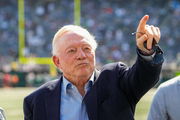
Philip Rivers Announces Retirement Decision After Colts Benched 44-YO QB
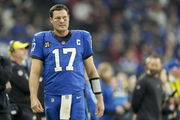
Former Packers QB Makes Decision on Shark Tank’s Offer for His $850K Business

Sean McDermott Announces Bad News for Bills After Massive Update on Josh Allen’s Injury
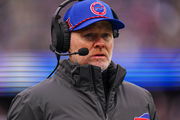
In addition to that, the Vikings QB is seen calling himself “a basic guy” and “pretty boring”. In fact, some scenes with Cousins are slow-paced. On the other hand, Marcus Mariota is under pressure since Atlanta has selected Desmond Ridder, who hopes to “eventually take his [Mariota’s] job”. While Kirk is seen visiting Psychologist Brownell Mack and still brooding over a play he missed, Mahomes is seen making up for his defeat against living legend Tom Brady on the field.
ADVERTISEMENT
Again, in contrast with Cousins, who, after 11 seasons in the NFL, still hopes to fill “this little notch in this [memory] room” with a Lombardi trophy “someday”, two-time Super Bowl champion Patrick Mahomes is seen already living the dream and looking forward to enjoying the offseason with his family at the end of the final episode of Quarterback. He is seen talking about his fish and casually playing basketball with his wife.
With all those details pointed out, would you say that Quarterback uses Cousins and Mariota mainly as contrasting figures who highlight the greatness of Mahomes? Would you say that Quarterback is actually an ode to Patrick Mahomes?
ADVERTISEMENT
Ellis: In terms of Quarterback (Fresh at 89%), one of the great qualities of this series is that the viewers get to witness multiple aspects of the position, and with each player comes a vastly different perspective on their craft. I would stop short of saying that Quarterback is an ode to Mahomes for a few reasons: the primary factor being that he really did win the Super Bowl, gain a measure of revenge for his previous shortcomings against a legend in Brady, and he simply is that good.
Had the facts been skewed or if Cousins’ Vikings went on a run and won the Super Bowl but it was still Mahomes being celebrated, then I would cry foul. The documentary doesn’t have to be an ode to Patrick because his efforts on the field last season didn’t require it…the season speaks for itself. Obviously, we can still say it’s a tribute to an incredible season, but whereas other sports docs skirted around the failures/shortcomings of their subjects, Quarterback feels more authentic to how each player’s season played out.

Imago
CA: Netflix’s QUARTERBACK Los Angeles Premiere – Arrivals L-R Brittany Mahomes and Patrick Mahomes arrives at the Netflix s QUARTERBACK Los Angeles Premiere held at the TUDUM Theater in Hollywood, CA on Tuesday, July 11, 2023. Los Angeles CA USA Copyright: xSipaxUSAx Editorial use only sipausa_47295739
Author: Documentary filmmakers who were part of ESPN’s 30 for 30 series were considered “film authors” which included the likes of Steve James (Hoop Dreams [1994]), Barbara Kopple (Harlan County, USA [1976]), and Albert Maysles (Gimme Shelter [1970], Grey Gardens [1975]) among others. As Malitsky has observed, these filmmakers, apart from providing “additional commentary”, would “often introduce the films”. However, we do not see the same in Netflix’s Quarterback.
ADVERTISEMENT
On the contrary, the documentary series is introduced by Peyton Manning, a former NFL quarterback who is also the executive producer of the series. What do you make of that?
Ellis: I love the 30 for 30 series and enjoy the little intros by the filmmakers. Having said that, I might’ve found it even more engaging if, say, the Bo Jackson 30/30 was introduced by a fellow running back, baseball player, or dual threat (imagine Deion Sanders introducing Bo Jackson’s doc, or Bo introducing Deion’s Primetime 30/30! I’m giddy just thinking about it!). But the primary reason seems to be to add another layer of legitimacy and relevance for the casual viewer who may not be as familiar with football, the position, or Cousins/Mariota.
ADVERTISEMENT
Folks who aren’t huge sports fans that happen to click on Quarterback might be drawn in by Peyton Manning more than a director. This is because Manning is one of the few athletes that has transcended his celebrity. And for hardcore football fans like myself, knowing that this series has his stamp of approval does reassure us that this will take our beloved sport seriously.
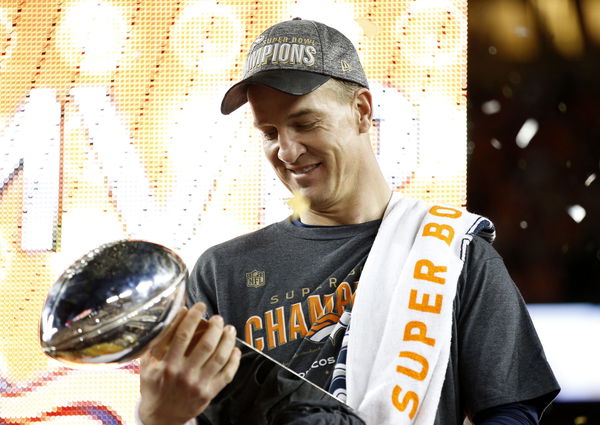
Getty
SANTA CLARA, CA – FEBRUARY 07: Peyton Manning #18 of the Denver Broncos looks at the Vince Lombardi Trophy after Super Bowl 50 at Levi’s Stadium on February 7, 2016 in Santa Clara, California. The Broncos defeated the Panthers 24-10. (Photo by Ezra Shaw/Getty Images)
Author: It has been argued that “contemporary sports documentaries continually assert that knowing about sport requires knowing about and through media”. Along these lines, sports documentaries have been held responsible for creating “a world in which knowing sports without the contributions” of a certain network becomes unimaginable. ESPN has long been a leading network in this case for quite some time.
ADVERTISEMENT
With several sports documentaries, is Netflix close to attaining the same status ESPN once enjoyed with the famous 30 for 30 series? And if “knowing about sport requires knowing about and through media”, are we in the process of readily associating sports with Netflix?
Ellis: I’m laughing because, as a stand-up comedian, I know this association all too well…anytime I or any of my peers release a new hour special, the first question from most people is “Oh is it on Netflix?”. So your question is incredibly insightful: most comedy fans associate a new special with Netflix in the same way sports documentaries were once inextricably linked to ESPN’s 30 for 30 (so much so that even when ESPN does video essays as a part of SportsCenter or Outside the Lines, we still lump it in under the 30 for 30 umbrella).
For the time being, I would say ESPN can still utilize their slogan “the worldwide leader” in relation to sports storytelling…but it’s clear that Netflix has the access and resources to make productions at the highest level of the medium. Now that they’ve given us football, tennis (Break Point, Fresh at 83%), golf (Full Swing, Fresh at 100%), racing (Drive to Survive, Fresh at 83%), and more documentary series, that gaping chasm between ESPN and everyone else has closed dramatically. I could easily see Netflix, at this current pace, being considered THE sports documentary house of note within five years.
ADVERTISEMENT
Author: In “Institutionalizing and Industrializing Sport History in the Contemporary Sports Television Documentary” Travis Vogan mentions Ian McDonald and bell hooks. In the context of Kon Ichikawa’s Tokyo Olympiad (1965) and Steve James’ Hoop Dreams (1994), to Hooks and McDonald, Vogan attributes the suggestion which says “documentaries do not simply display reality but build histories…with the potential to resist and perpetuate the conditions they showcase”. Are there any particular conditions that Quarterback either tries to resist or perpetuate? What do you think?
Ellis: Fantastic point here, and one that speaks to my heart and history: Hoop Dreams (Certified Fresh at 98%) is the first sports doc that I remember watching (and is still the first example I use when folks ask about the biggest Academy Award snubs in history!)…and while the myth-building of Tokyo Olympiad (Fresh at 100%) and so many pieces that followed is certainly substantial, the recency of Quarterback’s timeline puts it at a disadvantage: football fans just went through this season in real time 6 months ago, so it’s tougher to resist/perpetuate conditions than it would have been from a season long-gone or even one from a few years back.
The Last Dance (Certified Fresh at 97%), even with its primary subject being the most famous athlete that ever lived, and the Bulls team being such a transcendent presence in the world, had the benefit of time washing away some of our short-term memories. Quarterback, or Full Swing or Break Point, for that matter, do not. However, if someone like Mahomes continues to maintain this insane altitude of elite play and team success, we’ll look back at Quarterback and say that we saw this coming. (Conversely, if he doesn’t for whatever reason, it’ll be impossible to make a documentary looking back on his career, a la The Last Dance, and construct a narrative that smooths the wrinkles.)
ADVERTISEMENT

USA Today via Reuters
Minnesota Vikings quarterback Kirk Cousins (8) throws against the Indianapolis Colts during the first quarter at U.S. Bank Stadium. Mandatory Credit: Jeffrey Becker-USA TODAY Sports
Author: Mark Shapiro and George Bodenheimer placed SportsCentury within “institutional discourses”. Speaking of which, Shapiro branded SportsCentury “an opportunity for us to educate our viewers on the significant events and athletes of the past 100 years.” For most of the part, Quarterback restricts itself to “the huddle” and “the homes” of the three athletes. However, one cannot ignore the attempt Quarterback makes to “educate” the global viewers on the strategic aspects of American Football and the physical training that athletes require in the NFL.
For example, one can refer to Bobby Stroupe lecturing the viewers on Mahomes’ “off-platform throws” from a “physiological standpoint” and the three quarterbacks breaking down play types that sound Greek. In fact, the documentary is willing to argue that being a Quarterback is the same as being an academic.
“Getting ready for a game is studying for a final exam, like I’m in school again,” declares Cousins in episode 4. What do you make of Quarterback educating the global viewers on American Football?
Ellis: I’ll admit I did find the training/preparation aspect of Quarterback to be some of the most captivating moments of the entire series. The documentary likely features these workouts and film study for two key reasons: to illustrate that this is indeed a full-time job…the offseason is almost non-existent, the prep is around the clock, and this is indeed the toughest, most important position to play in all of sports. That knowledge could engage new fans around the world, as they see these Titans are still just human beings…that human condition that is so often overlooked because of the helmets, pads, and distance from the field that separates us from remembering that these aren’t supermen.
Read More – $179 Billion Power House Teases Urban Meyer Era, After Successful $400,000,000 Peyton Manning Project
But I also think it boils down to what we, sports movie fans, always require about two-thirds of the way into a film: the training montage! Doesn’t matter if it’s fictional Rocky running through the streets of Philadelphia, or the very real Steph Curry dribbling tennis balls and doing step drills…it’s inspiring to see that these are just people like us, and maybe if we put in that effort, one day we’ll be winning a championship (spoiler alert: most of us won’t. Believe me, I’ve tried).
Author: In “Failure Is Not an Option: Sport Documentary and the Politics of Redemption,” Thomas P. Oates speaks about the “Televised Sports Manhood Formula,” which finds “the costs of masculinity (especially pain and injury)… to be well worth the price; the boys and men who are willing to pay the price always seem to get the glory, the championships, the best consumer products, and the beautiful women.” How much of that statement is in agreement with Quarterback?
Ellis: It’s a great quandary that these athletes find themselves in: “I’ve put in the time, the effort, the blood, sweat, and tears…but so have the other starting quarterbacks in the league!” This series beautifully illustrates that all of their efforts to win don’t guarantee anything — it just gives you a chance. There’s the adage that the harder you work, the luckier you get…but it’ll only get you so far. We buy a lottery ticket for a dollar, but so did a billion other players.
In the NFL, the cost of that lottery ticket is much higher, but the reward of victory and all its spoils is an undisputed legacy as a champion. That seems to be the fuel for these three men at various stages of their careers: they can afford the best products, they appear to have loving partners and families, and everything else that we all dream of having…but the trophy isn’t for all of them, just one. And that’s what keeps them working and us watching.

Imago
January 29, 2022: Multiple sources report that seven time Super Bowl Champion, Tom Brady, will announce his retirement from the NFL, American Football Herren, USA /CSM..August 7, 2017: New England Patriots quarterback Tom Brady 12 waits to drill during a joint practice at New England Patriots training camp where they hosted the Jacksonville Jaguars on the practice fields at Gillette Stadium, in Foxborough, Massachusetts. /CSM Foxborough USA – ZUMAc04_ 20220129_zaf_c04_18
Via- Imago
Author: When The Brady 6 (2011) was released, Brady was already a three-time Super Bowl champion. The following was the status of some of his contemporaries who were drafted before him: Drew Henson was done with football and working with ESPN, Tee Martin had become a wide-receiver coach for Kentucky, Spergon Wynn was an Energy Trader in Houston, and Giovanni Carmazzi was a “yoga-exercising farmer” who lived with “five goats”.
Borrowing the words from Oates, with Carmazzi, it is fair to say that “physical punishment and personal sacrifice do not inevitably lead to victory but to suffering and frustration”. With major changes in the lives of Henson, Wynn, and Carmazzi, in The Brady 6, victorious Tom Brady stood as the dominant figure who thoroughly overshadowed his contemporaries.
However, with Mariota and Cousins remaining active, Quarterback leaves the viewers the luxury to observe if “physical punishment and personal sacrifices” one day lead Mahomes’ contemporaries to victory or suffering. What are your thoughts about that?
Ellis: We’d be remiss not to mention that, even though Kirk and Marcus are chasing the rings that Patrick has already won, they’re still handsomely compensated for their efforts. I don’t think Henson, Martin, Carmazzi or anyone else drafted before Tom in that draft retired simply because they knew he was too far out in front with three championships to catch. What sports teaches us is that eventually, whether or not we realized it at the time, our biggest opponent is ourselves. How long can I last, how many hours can I study, how heavy can I lift? It’s interesting in terms of careers with two elder statesmen of the quarterback position: the recently retired Tom Brady and the recently moved Aaron Rodgers. Both are considered legends already, but Brady has 7 rings and the 39-year-old Rodgers has just 1. Even the most optimistic Jets fan will admit they know Aaron can never catch Tom…but athletes have that ability to focus on the moment, clear out the noise, and play the next play as if it’s the only thing that matters.
Think of Tiger Woods staring down a putt, with all of the other things that have gone on in his professional or personal life, the pressure, the failures, the legacy, all of it. But at that moment, he’s only thinking about making this next putt. Nothing else matters. That’s the job of an elite athlete, and it might be why we love watching them so much. Quarterback displays their focus, desire, and talents. And much like a great QB during that final game-winning drive, if a story and its tellers are compelling enough, we, the viewers, are solely focused on enjoying that moment.
Watch This Story – Kenny Pickett keeps pace with Tom Brady and Gronk family’s fitness racing, surprises fans with nutrition launch
Do let us know if you have enjoyed reading the interaction. For more, follow EssentiallySports!
ADVERTISEMENT
ADVERTISEMENT
ADVERTISEMENT

